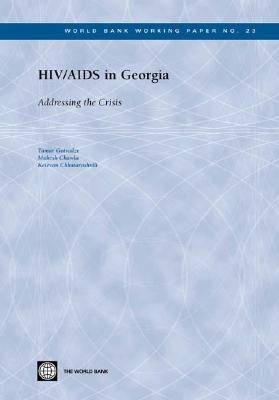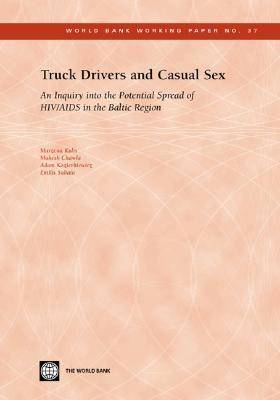World Bank Working Paper
2 primary works
Book 23
HIV/AIDS in Georgia
by Tamar Gotsadze, Mukesh Chawla, and Ketevan Chkatarashvili
Published 5 January 2004
HIV/AIDS in Georgia: Addressing the Crisis is part of the World Bank Working Paper series. These papers are published to communicate the results of the Bank's ongoing research and to stimulate public discussion. This book describes the characteristics of the HIV/AIDS epidemic in Georgia and assesses it's potential effect on the country's economic growth and on sectors, such as agriculture, transport, labor markets, health care and social security. It carefully analyses the strengths and shortcomings of the National Response and identifies potential areas and strategic actions for strengthening National Response capabilities. The book also provides projections of prevalence rates for 2000-2015 and their impact on population demographics. HIV/AIDS in Georgia is an important tool in placing the HIV/AIDS epidemic at the center of the development and aid agenda in Georgia and for identifying the most appropriate and cost-effective interventions in the context of poverty reduction.
Book 37
Truck Drivers and Casual Sex
by Maizena Kulis, Mukesh Chawla, Adam Kozierkiewicz, and Emilis Subata
Published 1 July 2004
Truck Drivers and Casual Sex is part of the World Bank Working Paper series. These papers are published to communicate the results of the Bank's ongoing research and to stimulate public discussion. Workers in the transport industry, including long-distance drivers, are at a high risk of HIV infections. Frequent traveling, long absences away from home, long waits at border crossings and the apparent abundant presence of commercial sex workers at these places mean truck drivers are particularly vulnerable to engaging in casual sex. While the threat of an HIV/AIDS epidemic cannot be taken lightly in any country of the Europe and Central Asia region, four countries - Poland, Latvia, Lithuania and Estonia - stand out as being particularly vulnerable. First, the prevalence of HIV/AIDS is relatively high and is rapidly increasing in locations neighboring these countries, like Ukraine, Belarus, and Moldova, where public health conditions are also rapidly deteriorating.
Second, because of their geographical location, Poland, Estonia, Latvia and Lithuania stand at the crossroads of the main East-West and North-South transport corridors, and represent the link between countries of the former Soviet Union and western Europe. The open borders and rapid transit threatens to broaden the sweep of the HIV epidemic, from Russia, Ukraine and Belarus to Poland, Estonia, Latvia and Lithuania, as drug injectors and sex workers come into contact with other population groups in these countries. Truck Drivers and Casual Sex is based on a survey that explores the practice of casual sex among truck drivers and commercial sex workers in the border areas of Poland and Lithuania at a point of time. It uses this evidence to extrapolate the potential impact of these practices on the spread of HIV/AIDS in these countries.
Second, because of their geographical location, Poland, Estonia, Latvia and Lithuania stand at the crossroads of the main East-West and North-South transport corridors, and represent the link between countries of the former Soviet Union and western Europe. The open borders and rapid transit threatens to broaden the sweep of the HIV epidemic, from Russia, Ukraine and Belarus to Poland, Estonia, Latvia and Lithuania, as drug injectors and sex workers come into contact with other population groups in these countries. Truck Drivers and Casual Sex is based on a survey that explores the practice of casual sex among truck drivers and commercial sex workers in the border areas of Poland and Lithuania at a point of time. It uses this evidence to extrapolate the potential impact of these practices on the spread of HIV/AIDS in these countries.

